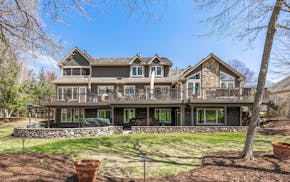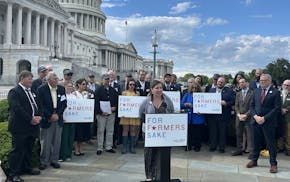For Lori Galligan, the race is on to get a new car.
She loves her 10-year-old Toyota Prius — there's nothing wrong with it, she says — and her husband's 2012 Highlander is still good for long road trips. But with the threat of tariffs expected to drive up sticker prices on new cars, the Mendota Heights couple found themselves kicking the tires on the latest models at the Twin Cities Auto Show on Friday morning.
"We probably wouldn't be looking right now, because we always put it off," Galligan said while checking out a 2025 Toyota Crown Signia in storm-cloud blue. She said the uncertainty around the car market is "kind of forcing our hand."
"We're going to get one, probably before it all hits the fan somehow," Dennis Galligan added, with a laugh.
The couple were among the first to step into the massive showroom of the Twin Cities Auto Show, which opened Friday morning at the Minneapolis Convention Center. Billed as the biggest consumer event in the Upper Midwest annually, the attraction each year offers car buyers a glimpse at brand-new stock from U.S. and foreign makers.
The sales pitch from Twin Cities car dealers: Now is a great time to buy.
Absent a destructive seasonal storm, winter is generally a calmer time in a Minnesota dealership. But, here and nationally, more eager buyers started visiting showrooms within the past few weeks as the yet-to-be-realized toll of automobile tariffs lies on the road ahead, said Scott Lambert, president of the Minnesota Automobile Dealers Association.
New cars parked on dealer lots across town are generally from the standard three-month-old inventory and currently reflect pre-tariff prices, Lambert said. Precisely how much of the tab consumers will pick up is unclear, he said, but "it will have an impact."
"What people should do is come down to our auto show," Lambert said. "Do some shopping around and figure out what they want to buy. Timing is pretty good."
The specific 25% tariffs on autos and parts — the latter is slated to roll out in May — threaten a complex manufacturing system built around longstanding U.S. trade agreements with Mexico and Canada. Some vehicles will cross the Canada or Mexico border several times before rolling off the final assembly line. North American manufacturers that supply specific parts also rely on imported raw materials that trade experts predict will cost more to produce.
Experts also say there is no safe harbor, and the taxes will hit carmakers, whether U.S.-based or foreign.
Major U.S. markets took a wild ride this month as President Donald Trump suddenly imposed, and then paused, his so-called reciprocal tariffs on dozens of countries. Despite earlier warnings, the duties publicly revealed last week exceeded the worst expectations of many analysts and business executives, plunging stock prices into a dive unseen since the onset of COVID-19.
Markets rebounded some this week after Trump put a 90-day pause on some of the biggest tariffs, acknowledging a "yippy" reaction in the markets to the new policy.
Meanwhile, auto industry experts and analysts are contending with a fast-moving federal trade policy while attempting to sort out where U.S. manufacturers, suppliers and consumers will absorb costs.
For makes and models least-affected by the higher taxes, consumers could wind up paying an additional $2,500 to $5,000, according to an analysis from Michigan-based Anderson Economic Group. Midsized vehicles, including some passenger vans and pickup trucks, are expected to go up between $5,000 and $8,500. The highest expected jump is for full-size SUVs that contain parts from Canada, Mexico and Europe, ranging from $10,000 to $12,000 more per vehicle.
And some imports could cost $20,000 more, the group found.
Many manufacturers, dealers and assembly line workers were initially optimistic about potential for improved business under Trump. The new administration signaled potential to a reduce electric vehicle mandates, ease fuel economy regulations and cut taxes for consumers pained by inflation pressure, said Patrick Anderson, president of AEG, the consulting and research firm that focuses on the auto industry.
"Now there is somewhere between shock and pessimism throughout the industry," Anderson said.
Consumers stand to bear most of the increased costs, Anderson said. Those looking at the impact of tariffs should buy a new car "right away" if they see one with the desired equipment, he said, or take good care of the used one they own.
"It's about to become more valuable, and you're probably going to be driving it longer," he said.
Visitors to the auto show on Friday had access to vendors, driving simulators and prize raffles. One attraction dubbed "Camp Jeep" provided a ride-along of an indoor obstacle course with steep ramps and rough terrain to demonstrate the off-road abilities of the car maker's latest models.
In another showroom, replicas plucked straight out of Hollywood — the Batmobile, Mystery Machine and KITT, to name a few — were on display courtesy of local charity Cars Against Crime Foundation. Also on the program this week are meet-and-greets with reality TV mechanics Constance Nunes and Jaime Hjelm.
Visiting the Twin Cities show on Friday morning was Wade Teply, 54, of Crystal, and his son Jake, 24, a recent college graduate in engineering. Both wanted to browse the new models this year.
The younger Teply was eager to see the new Corvettes and Hummer. But realistically, his father reminded him, a midsize truck will probably be more his speed when the time does come around to buy.
After taking a test ride in a new Jeep on the elaborate obstacle course, the father and son took a moment to eye a black 2025 Nissan Frontier with all-wheel drive. The Teplys view a truck as most practical for trips to the family cabin up north and hauling snowmobiles and four-wheelers.
Jake is looking at getting a new truck in the near future. He is a little worried about costs going up, like they did during the COVID-19 pandemic.
"I could see that happening again," he said.

St. Cloud space shuttle project goes on, despite financial woes of its guiding force

Luxe Chaska house overlooking Hazeltine golf course listed for nearly $1.6M

University of Minnesota assembles new team after losing backing for cancer therapy

Solventum, facing tariffs of up to $100 million, raises sales guidance

